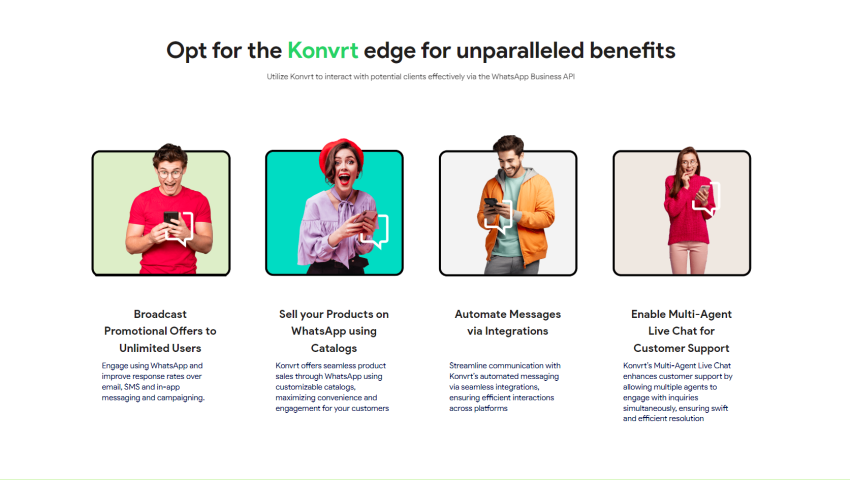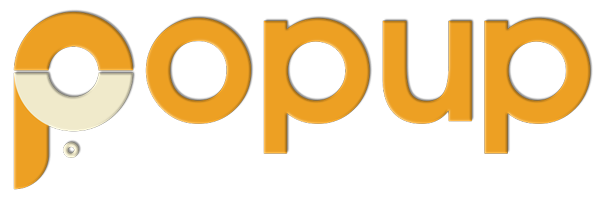
Whatsapp Marketing
Maximize your sales potential and enhance customer engagement by utilizing the WhatsApp Business API platform, which automates marketing, sales, and support processes. With over 2 billion active users globally, We offer a highly accessible and efficient channel for businesses to reach a wide audience. Our WhatsApp marketing can be used for customer engagement, brand promotion, and lead generation.
Our official Whatsapp Business API Platform is Konvrt. To know more. please visit our Konvrt Website

Here’s an overview of the major features and uses of WhatsApp Marketing:
Our direct messaging marketing allows businesses to communicate with their customers using WhatsApp. With over 2 billion active users globally, Our WhatsApp Business API offers a highly accessible and efficient channel for businesses to reach a wide audience. Our WhatsApp marketing platform can be used for customer engagement, brand promotion, and lead generation, providing a personalized and immediate way to connect with customers.
- WhatsApp Business Platform
- WhatsApp Business API
- WhatsApp Marketing Strategies
- WhatsApp Group Marketing
- Multimedia Messaging
- WhatsApp Status
- Customer Support and Service
- WhatsApp Marketing Best Practices
- Analytics and Tracking
- Security and Privacy
1. WhatsApp Business Platform
- Business Profile: Create a profile with your business details, such as address, description, email, and website, for customers to view.
- Labels: Organize your customer conversations by labeling them as new customers, returning clients, or potential leads.
- Quick Replies: Set up predefined responses to frequently asked questions for faster customer service.
- Catalog: Showcase your products or services directly within the app, allowing users to browse and place orders seamlessly.
- Broadcast Lists: Send the same message to multiple contacts without creating a group, which is useful for promotional messages or updates.
2. WhatsApp Business API
- Automation and Integration: The API allows businesses to integrate WhatsApp into their CRM, customer support tools, or chatbots for automation.
- Personalized Messaging: Send personalized messages based on customer data, such as order status updates, appointment reminders, or product recommendations.
- Customer Support: Provide real-time customer service, helping users with queries, complaints, or general information via a direct messaging platform.
- Notifications and Alerts: Send transactional messages like order confirmations, delivery status updates, or event reminders to keep customers informed.
- Two-Way Communication: Customers can respond to messages, ask questions, and engage with your business directly.
3. WhatsApp Marketing Strategies
- Engagement and Retargeting: Use WhatsApp to re-engage customers who’ve interacted with your website or social media pages by sending follow-up messages, exclusive offers, or personalized content.
- Customer Feedback: Conduct surveys or ask for feedback directly through WhatsApp, allowing for real-time responses and insights into customer satisfaction.
- Exclusive Offers and Promotions: Share special offers, discount codes, and promotions via WhatsApp to encourage immediate action from recipients.
- Event and Webinar Invitations: Send personalized invitations to events, webinars, or special business announcements through WhatsApp, ensuring higher visibility and engagement.
4. WhatsApp Group Marketing
- Community Building: Create groups where customers can join to receive updates, interact with each other, and stay connected with your brand.
- Niche Groups: Form segmented groups of customers based on their interests, preferences, or purchase history to share targeted content and offers.
- Exclusive Access: Offer group members exclusive access to sales, new product launches, or early-bird discounts.
5. Multimedia Messaging
- Rich Media Sharing: Share images, videos, PDFs, GIFs, audio messages, and even location pins to create dynamic and engaging interactions.
- Product Demonstrations: Use videos and images to showcase product demos, tutorials, or usage tips that can help customers better understand your offerings.
- Interactive Messaging: Send clickable links, contact details, or appointment scheduling prompts within messages for seamless customer interaction.
6. WhatsApp Status
- Status Updates: Post short, time-limited updates (text, images, or videos) to keep your audience engaged, similar to Instagram Stories. This can be used to promote products, announce sales, or share behind-the-scenes content.
- Limited-Time Offers: Create a sense of urgency by posting flash sales or limited-time discounts via WhatsApp Status.
7. Customer Support and Service
- Instant Communication: Provide immediate responses to customer inquiries, helping to resolve issues quickly and improve customer satisfaction.
- Chatbots: Implement AI-powered chatbots to handle common customer queries, such as FAQs, booking confirmations, or order tracking, allowing for 24/7 support.
- Live Assistance: Offer live customer support via WhatsApp, enabling your team to resolve complex issues in real-time.
8. WhatsApp Marketing Best Practices
- Consent-Based Marketing: Ensure that customers have opted in to receive messages from your business to comply with privacy regulations and avoid being seen as spam.
- Personalization: Use customer data to send personalized messages, addressing customers by name and offering products or services based on their preferences or past interactions.
- Timing: Send messages at appropriate times to avoid annoying customers, and always respect time zones.
- Frequency: Be mindful of message frequency—avoid overwhelming customers with too many messages, as this could lead to opt-outs.
9. Analytics and Tracking
- Message Delivery and Read Reports: WhatsApp shows message delivery and read receipts, helping businesses understand message visibility and customer engagement.
- Engagement Tracking: Monitor responses, engagement rates, and follow-up actions to gauge the effectiveness of WhatsApp campaigns.
- Customer Insights: Analyze conversations to gain valuable insights into customer preferences, pain points, and behaviors.
10. Security and Privacy
- End-to-End Encryption: WhatsApp ensures that all messages between businesses and customers are encrypted, offering a secure communication channel.
- Trust and Credibility: The use of verified business profiles helps build trust with customers by ensuring they are interacting with legitimate entities.
With our WhatsApp API digital marketing strategy, businesses can provide personalized, direct communication that strengthens customer relationships, enhances service, and drives conversions.
